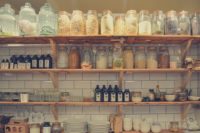The global food loss is about one-third of all the food produced for human consumption, that is, about 1.3 billion tons per year. This is a staggering amount, and we must start taking steps to keep our foods fresh to reduce the amount of food that ends up in our trash cans. Food wastage is not just financial wastage, but also energy wastage. One of the most important reasons why we throw away our food is that they become stale when kept for a few days. Improper storage of food is one of the reasons. Proper shopping of fruits and vegetables and proper usage of leftover food can reduce your food wastage.
There are many ways to keep food fresh for a longer time
Local produce
 Local produce is the healthiest produce because vegetables start losing their nutritional value when picked, so the faster they are consumed after being picked, the better it is. Therefore, we must always try to purchase the local produce to ensure a good supply of nutrients to our body. Local produce lasts longer than the supermarket food. The supermarket food has already traveled a long way to ending up in our kitchen. It has not only lost much of its nutritional value but also becomes stale in a short time.
Local produce is the healthiest produce because vegetables start losing their nutritional value when picked, so the faster they are consumed after being picked, the better it is. Therefore, we must always try to purchase the local produce to ensure a good supply of nutrients to our body. Local produce lasts longer than the supermarket food. The supermarket food has already traveled a long way to ending up in our kitchen. It has not only lost much of its nutritional value but also becomes stale in a short time.
Planning meals
Planning meals is an important step to keep your food fresh for a long time. When you plan what you want to eat, there are fewer chances that your food will get spoilt. When you plan meals, you can shop accordingly. Only when you have finished your stock of fruits and vegetables, you must go to a store and restock them. Otherwise, they will not remain fresh. You must only buy what you need. Besides, you must finish off the foods that get spoiled too fast like bananas, cherries, strawberries, mushrooms, etc.
Shop strategically
You must buy only what you need. You must always purchase fruits and vegetables locally and buy them last because when you trek the whole store with vegetables and fruits in your basket, they start deteriorating.
Proper storage
 The temperature of storage of fruits and vegetables may vary. For example, it is recommended to store bananas at room temperature until they ripen and in refrigerators once they ripen. Mushrooms must be stored in a plastic bag in refrigerators. Onions must be stored in a dark, cool place, without any moisture. Onions must not be stored with potatoes because the gas given out by potatoes ripens the onions. Tomatoes must be stored at room temperature only. Lettuce must be wrapped in a towel and placed in an open storage bag. It is recommended that you do not store fruits and vegetables together because many fruits give off ethylene gas that is not favorable for vegetables. Such gas producing fruits like apples, apricots, and honeydew must be stored in refrigerators. Do not stock everything in your fridge. Potatoes, onions, etc. must not be refrigerated. The must be stored in a cool, dry place. The vegetables must be kept on the bottom shelf in the refrigerator. The tops of radishes and carrots must be cut off before storing to allow them to retain moisture.
The temperature of storage of fruits and vegetables may vary. For example, it is recommended to store bananas at room temperature until they ripen and in refrigerators once they ripen. Mushrooms must be stored in a plastic bag in refrigerators. Onions must be stored in a dark, cool place, without any moisture. Onions must not be stored with potatoes because the gas given out by potatoes ripens the onions. Tomatoes must be stored at room temperature only. Lettuce must be wrapped in a towel and placed in an open storage bag. It is recommended that you do not store fruits and vegetables together because many fruits give off ethylene gas that is not favorable for vegetables. Such gas producing fruits like apples, apricots, and honeydew must be stored in refrigerators. Do not stock everything in your fridge. Potatoes, onions, etc. must not be refrigerated. The must be stored in a cool, dry place. The vegetables must be kept on the bottom shelf in the refrigerator. The tops of radishes and carrots must be cut off before storing to allow them to retain moisture.
Washing berries
The berries must be washed with white vinegar and water before putting them in the fridge. This kills the bacteria and mold spores in them that makes them fuzzy.
Put paper towels in salad drawers
You must always wrap your salad with paper towels because excess moisture can wilt them. Paper keeps them fresh for a longer time by absorbing the moisture and also keeps your fridge cleaner.
If you are tired of seeing your fruits and vegetables getting spoiled just two days after you buy them, you must learn ways to store them so that they remain fresh for a longer time. You must learn how to keep food fresh to stay healthy. Remember, fresh food is the healthiest food.


